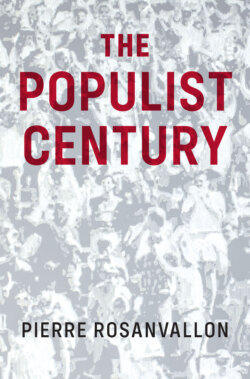Читать книгу The Populist Century - Pierre Rosanvallon - Страница 24
The Latin American precedent
ОглавлениеSince the mid-twentieth century, Latin American populism has illustrated in exemplary fashion this constitutive dimension of today’s populisms. The phenomenon is not surprising, for populism has emerged in less-industrialized countries that were structured not so much around a class system as around landownership and oligarchic forms of domination. The opposition between the people and the elites was thus the most telling one for a great many citizens. It was in this context that the theme of a leader embodying the people appeared. “I am not a man, I am a people”: these words, insistently repeated in the 1930s and 1940s by Colombian leader Jorge Eliécer Gaitán, set the tone for later populisms throughout the continent.3 Gaitán’s profile is worth lingering over, so well does it express the ambiguities of that nascent populism; Gaitán was as vehemently opposed to capitalism as he was attracted to the European fascisms that were then on the rise. Studying in Rome in 1926–7, he wrote a thesis under the direction of Enrico Ferri, a celebrated criminologist who had shifted from socialism to fascism. Having become Ferri’s protégé, Gaitán attended several of Mussolini’s meetings and later avowed that he had been impressed by that leader’s ability to dominate his audience and energize a crowd. He even carefully studied Il Duce’s gestures and the way he modulated his tone of voice to hold his audience’s attention – techniques that Gaitán went on to reproduce in his political action in Colombia. “The people’s candidate” in presidential elections, both an anti-capitalist and an adversary of the traditional oligarchy, Gaitán was assassinated in 1948. (We shall return to his writings later on.) Since then, his name has come to symbolize the Latin American spirit of populism, in its language as well as in its anti-oligarchic stance, with all the attendant ambiguities. Gaitán was admired by both Fidel Castro and Juan Perón; the latter also sought to become the Leader Embodying the People and spoke of “depersonalization” to characterize the plans that the revolution had embedded in him;4 implying that his individuality was being absorbed by that of the Argentineans.
Hugo Chávez, referring explicitly to Gaitán, hammered in the formula during the 2012 presidential campaign for the presidency in Venezuela. “When I see you,” he regularly said to the crowds gathered in meeting halls,
when you see me, I feel it, something tells me: “Chávez, you are no longer Chávez, you are a people.” In effect I am no longer myself, I am a people and I follow you, that is how I experience it, I have embodied myself in you. I have said it before and I say it again: we are millions of Chávezes; you too, a Venezuelan woman, you are Chávez; you too, a Venezuelan soldier, you are Chávez; you too, a fisherman, a farmer, a businessman, you are Chávez. Because Chávez is no longer myself. Chávez is a whole people!5
Thus was reborn the old idea of mirror representation.6 In his first speech after his inauguration as president of the Republic in 1999, he went so far as to tell his audience: “Today, I am turning myself into your instrument. As for me, I scarcely exist, and I shall carry out the mandate you have entrusted to me. Get ready to govern!”7
